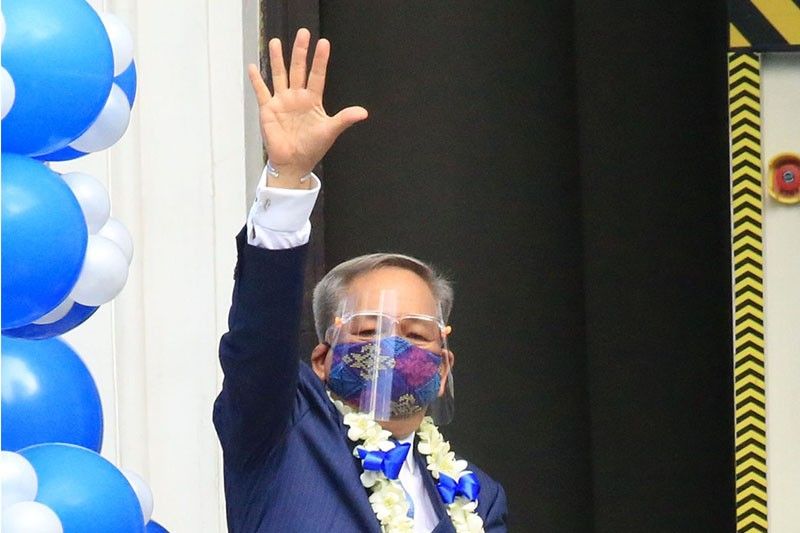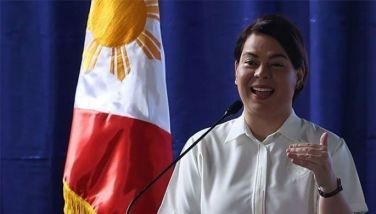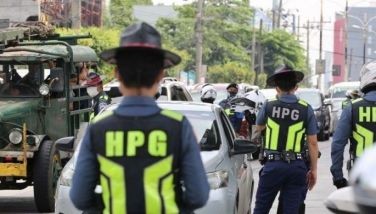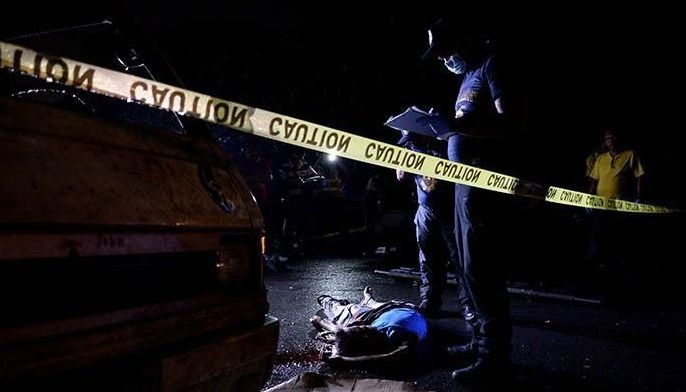The Peralta Court: A quick shift to digitization and pressure over killings of activists, lawyers

MANILA, Philippines — (Updated March 24, 2021; 9:33 a.m.) Chief Justice Diosdado Peralta’s term is characterized by a rapid shift to digitization of court process due to pandemic — no mean feat, as he said — but the last few weeks of the Peralta court also saw the Judiciary facing mounting pressure over the extrajudicial killings of lawyers.
Peralta is officially hanging up his judicial robes on March 27, a year ahead of his mandatory requirement and after 34 years of service in the Judiciary. He headed the Judiciary for a year and five months, which was mostly was spent in a pandemic, forcing the SC to craft policies after policies to ensure access to courts while protecting the welfare of its nearly 30,000 officials.
Addressing the SC for the last time on Monday, Peralta recalled judicial reforms and policies issued to cope with the health crisis. "This is just proof that in the middle of the challenge that we faced because of the pandemic, your safety and welfare was always on our minds. The Supreme Court will not abandon you," he said in Filipino.
But as the chief justice ends his stint in a few days, the Judiciary grapples with continued attacks on lawyers — from threats and intimidation, baseless linking to communist groups to brazen killings — and a call to look into the very rules meant to protect constitutional rights and the legal practice in the country.
In his last en banc session with the court, the SC made a rare move of issuing a statement as a collective body and condemned the killings of lawyers and threats against judges.
The justices said on Tuesday: “To threaten our judges and our lawyers is no less than an assault on the Judiciary. To assault the Judiciary is to shake the very bedrock on which the rule of law stands. This cannot be allowed in a civilized society like ours. This cannot go undenounced on the Court’s watch.”
18 procedural rules and guidelines
Prior to becoming the chief justice, then-Associate Justice Lucas Bersamin hailed Peralta for his help in leading the committee on revision of Rules of Court, and the adoption of the 2019 Guidelines on the Use of Videoconferencing Technology for Remote Court Appearance or Testimony of Persons Deprived of Liberty in Jails and National Penitentiaries.
For his stint as head of Judiciary, Peralta drew up a ten-point agenda, including the perennial problem of clogged court dockets and continuous revision of the Rules of Court, and in his last flag ceremony on Monday, he highlighted that almost all of the items in his 10-point agenda list came into fruition.
“Under my helm, the Supreme Court has formulated and approved 18 procedural rules and guidelines meant to improve the administration of justice and address the problem of clogged court dockets,” he said.
Peralta spearheaded the committee on the 2019 Amendments of the 1997 Rules of Civil Procedure and to the Revised Rules of Evidence, which was launched in August 2020.
Meanwhile, under the Peralta court, the SC also released the Revised Rules of Procedure for Intellectual Property Rights Cases in October 2020, issued guidelines to expedite expropriation cases in January 2020 and approved rules on Destruction and Disposal of Seized Dangerous Drugs in March 2020.
With Peralta at the helm, the SC has also fully organized its Judicial Integrity Board, first formed in November 2018, to purge erring officials and personnel among their ranks.
A stop to extrajudicial killings: Former SC Justice Antonio Carpio, in a recent column, pointed out that the SC is clothed with “unique” rule-making powers that may address the killings of activists and attacks on lawyers.
But Peralta raised they are being careful in flexing this authority, as he stressed that amending the rules is not easy.
Consultations have to be made first. He said: “We believe the SC — because it has the power to promulgate rules pertaining to practice and pleadings — we are also very careful in performing that duty because it is only the Philippines were SC is allowed to promulgate rules that’s why are taking care of that power because that is rare.”
Lawyers' and rights groups however are pressing the SC with urgency in their pleas as killings continue and become more brazen.
Progressive group Bagong Alyansang Makabayan, one of the groups seeking a review of the Rules of Court, issued a challenge to Peralta: “Let his legacy be that of stopping the tide of extrajudicial killings, trumped up charges, red-tagging, terrorist labeling and other abuse being committed by state forces.”
READ: 139 lawyers make fresh plea to SC: Review, revise rules on search warrants
On Tuesday, Peralta’s last full court session, the SC said it resolved to promulgate rules on the use of body cameras during service of search and arrest warrants. It also ordered the Office of the Court Administrator to coordinate with law enforcers to investigate an attempt to Mandaluyong Judge Monique Quisumbing-Ignacio after she freed two activists.
The tribunal, in a stirring statement, said: “The Supreme Court has always operated within institutional restraints, but it is far from resigned to spectate as clear breaches of constitutional rights are carried out beyond its halls.”
An accelerated shift to digitization
Barely half a year into heading the Judiciary, Peralta had to tread uncharted waters: The COVID-19 pandemic had broken out but justice needed to still be accessible, especially on petitions concerning measures meant to address the public health emergency.
Mid-March last year, the whole of Luzon was placed on lockdown with public transportation suspended due to rising COVID-19 cases. The SC initially shortened its work hours, while night courts were suspended, but four days later, Peralta ordered the “physical closure” of courts nationwide.
But Peralta then assured that urgent matters, including those that concern a person’s liberty and legal questions on the public health emergency, will still be tackled.
By end of April, Peralta issued a circular allowing the pilot testing of videoconferencing on “hearings on urgent maters in criminal cases involving [Persons Deprived of Liberty]” during the period of public health emergency.
The SC has also been releasing circulars to help decongest jails amid the pandemic, such as allowing electronic filing of charge sheets and transmission of release orders, reiteration of guidelines on release of qualified PDLs through self-recognizance and provisional dismissal, pilot testing of videoconference of urgent trials and issuing new guidelines on the reduced bail and recognizance as modes for releasing of indigent PDLs.
Since the pandemic, courts have conducted 192,444 video conferencing hearings, with the success rate of 88%, from May 4, 2020 to Feb. 5, 2021. The courts have also released 122,178 persons deprived of liberty (PDLs) from March 17, 2020 to Feb. 11, 2021.
The SC also approved the purchase of vaccines for its nearly 30,000 officials and employees.
People vs Almonte: Political prisoners who knocked on the SC gates for temporary release under humanitarian grounds had to wait for five months for a ruling, only to lose and be directed instead to lower courts.
During their five-month wait, a political prisoner gave birth and got separated from her first-born. Their reunion, after an emotional battle at the Manila court, happened only at Baby River’s wake.
READ: Group asks Chief Justice Peralta: Be a humane, more active court | On International Day of Solidarity with Political Prisoners, group presses SC to promulgate rules for Kalayaan writ
Peralta addressing criticism on this ruling, said on October 23: “We tried our best... and I hope Mrs. Nasino understands also the court and the others. That’s what really happened. There was no intention to delay it. It’s because there are really limitations.”
Philippine jurisprudence
SC employees thanked Peralta for his significant contributions to the Philippine jurisprudence in at least two landmark rulings he penned: In 2017, declaring the prohibition on plea bargaining in drug-related cases in Estipona vs Lobrigo and in 2018, the recognition of divorce obtained by a Filipino from a foreign spouse.
Peralta also wrote the controversial ruling that allowed the burial of the late dictator Ferdinand Marcos’ remains at the Libingan ng mga Bayani. In a public interview in August 2018, Peralta claimed “Filipinos found closure and the wounded family of the dead and injured by martial law were able to move on” in the ruling.
As the country grapples with the pandemic, petitions in 2020 were filed questioning the powers of the executive branch under the Bayanihan law, and the health disclosure and capacity of President Rodrigo Duterte amid a public health crisis. Both petitions were junked outright. Peralta was part of the majority vote in both cases.
During Peralta’s term as chief justice, the SC, sitting as Presidential Electoral Tribunal, put to rest questions on the legitimacy of Vice President Leni Robredo’s electoral win after more than four years of proceedings.
The vote to junk former Sen. Bongbong Marcos’ poll protest was unanimous, but as the SC has yet to make the ruling public, it remains unknown whether Peralta concurred only with the dismissal or with the results.
The Anti-Terrorism Act of 2020: The SC, under Peralta’s helm, also saw 37 petitions filed against just one law: The much feared Anti-Terrorism Act of 2020.
Peralta is stepping down in the middle of oral arguments, resumption of which has been pushed back for the third time due to COVID-19 threat.
Nine months since the first petition and debates that keep suffering postponements due the pandemic, the SC has yet to issue a temporary restraining order against the law’s implementation. Fresh pleadings have since reopened deliberations on the petitioners’ prayer for relief.
Peralta leads his last en banc session on Tuesday. On the list of issues to be tacked by the court are killings of activists and lawyers.
- Latest
- Trending
































